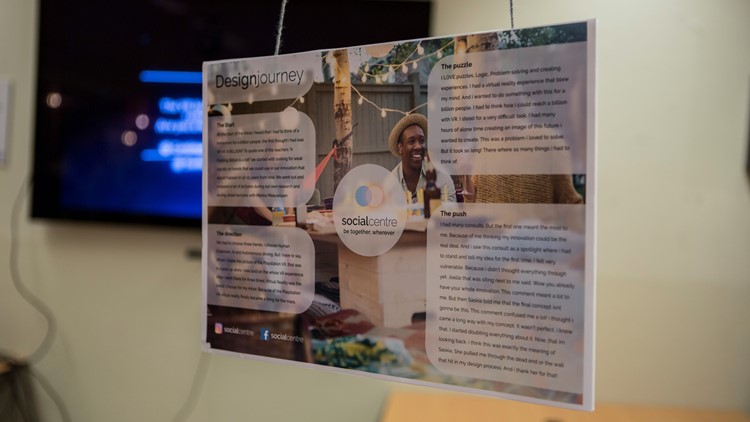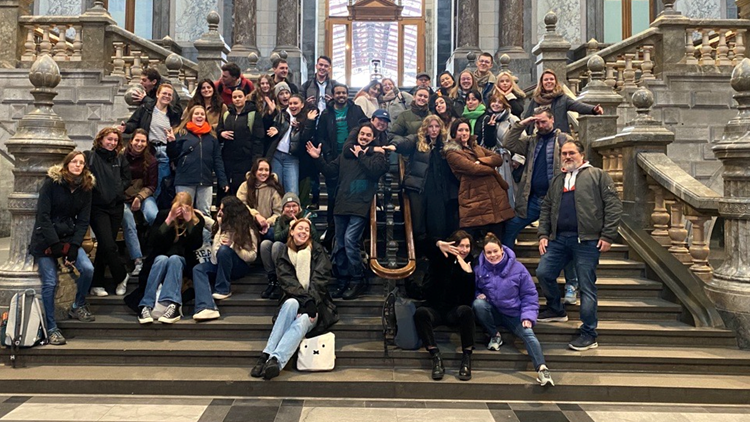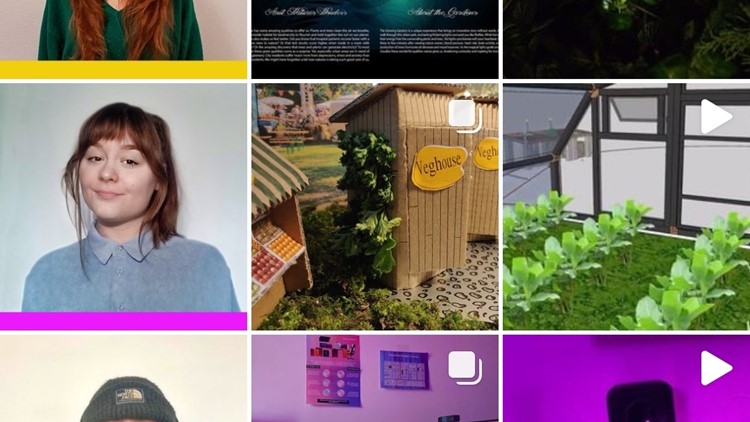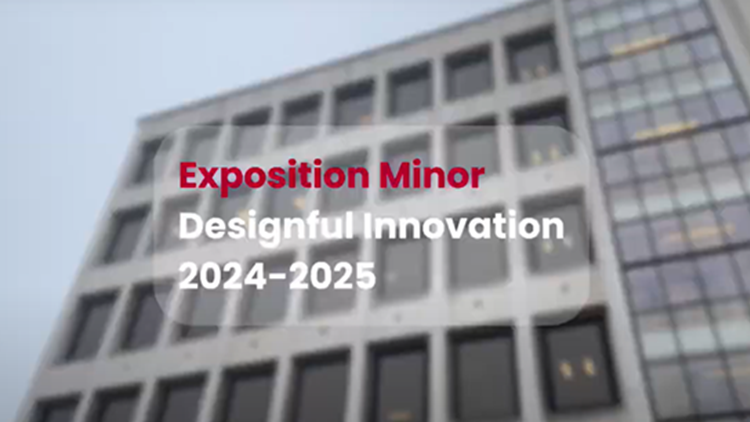Facts and figures
The programme at a glancePart of School
Programme information
What to expectAbout the programme
How to impact one billion people
In an intensive programme consisting of thematical weeks on Speculative Trend Watching, Design Psychology, Cross Cultural Design, Creative User Research, Creative Concepting, Business modelling and Exposition Design you will gain all the knowledge you need to change the existing. You will be challenged to design an innovation and corresponding prototype(s) which should be meaningful to no less than 1 billion people.
Get an impression of the projects that were created last year. In this small booklet (7MB) we created an overview. At this exposition website you can see the work of last year's students.
Groundbreaking innovations
The programme responds to the new developments within the domain of Design Thinking, Value Sensitive Design and Innovation Design. In the course you work on formulating new design principles to achieve new 'groundbreaking' innovations. To achieve this, you will organise your own network of “interpreters” (Verganti) to help you in the different stages of your design process. The Rotterdam approach is a mindset which is important in the programme: innovative, practical and results-oriented, socially involved, entrepreneurial and focus on (interdisciplinary) collaboration.
Method
Educational methods
The course has a solid personal, knowledge and practice-oriented programme to develop a design driven mindset. We use a range of educational methods: (guest) lectures, tutorials, workshops, pressure cookers, pitches, field trips and excursions (abroad).
You will get input, coaching, workshops and feedback from experts in the field, senior lecturers of Rotterdam University of Applied Sciences and (international) guest lecturers.
You will have to demonstrate that you have carried out research thoroughly and with a critical mindset, for both the knowledge-based as well as the practical modules. All classes are taught in English.
Design research methods
Design research methods like speculative design, cultural hunt, creative ideation, cultural probes, key insights, non-human personas, extreme user scenarios, customer journey mapping, business model canvassing, dragons den sessions and creative testing will help you in your creative design process.
Type of assessment
Practically all the exchange programme assignments are made individually. Students are allowed to work in groups of two to three people during some of the assignments, in order to brainstorm and gather new insights together. The theory from the modules 'Design Driven Innovation 1 + 2', 'Cross-cultural/International Business modelling' and 'Transformation Design' will be tested through assignments, book discussions, making a video/animation and preparing as well as organising and executing workshops with a group of students.
The practice based modules 'Convince the world' and 'Make it Happen' will be tested through fieldtrips, classroom participation, organising and realising a final exposition and a final innovation report. There are no written exams for this programme.
Quick overview assessments
- Presentations
- Workshops
- Reports
- Exposition(s)
- Prototype Demo
- Deliverables thematical weeks
- Classroom participation
Field trip
Since Europe is on our doorstep ... next to taking classes, workshops and participating in pressure cookers, you will also look beyond our borders by going on fieldtrips to for example Antwerp, Brussels, Dusseldorf and Cologne. You can contact main lecturer Saskia Best for further details.
Learning outcomes
If you have successfully completed this exchange programme then you are able to:
- Apply different types of design research when translating them into innovative concepts.
- Analyse how innovations are created and 'map' how different innovations relate to each other.
- Create a new network for interpreters in order to come up with a vision for new concepts.
- Define and apply design principles for 'design driven innovation'.
- Design in and for a cross-cultural environment.
- Realise and communicate believable prototypes for a 'design driven innovation concept'.
- Present design driven concepts individually, with conviction, defend them and critically assess them.
Calendar
|
Planning Fall 2025-2026 |
|
|
Block 1 |
|
|
Week 1 |
Being a culturally sensitive innovator |
|
Week 2 |
Speculative Trend Watching (group) |
|
Week 3 |
Cross cultural /Inclusive Design |
|
Week 4 |
Speculative Trend Watching (Individual) |
|
Week 5 |
Make Week |
|
Week 6 |
Your inside out Innovation |
|
Week 7 |
Your inside out Innovation |
|
Fall Break |
|
|
Week 8 |
Deliver Week |
|
Block 2 |
|
|
Week 9 |
Cross cultural /Inclusive Design |
|
Week 10 |
Business Week |
|
Week 11 |
Dragons’ Den Week |
|
Week 12 |
Business Week |
|
Week 13 |
Storytelling Week |
|
Week 14 |
Expo Design Week |
|
Week 15 |
Final Testing Week |
|
Christmas Break |
|
|
Week 16 |
Expo Design Week |
|
Week 17 |
Showtime Week |
|
Week 18 |
Deliver Week |
|
Week 19 |
Resit Week |
Awarding
After completing your exchange programme at Rotterdam University of Applied Sciences, you will receive a:
- Transcript of records
Subjects
An indication of the subjects you can expectBlock 1
-
Design Driven Innovation 1 (4 ECTS)
Design Driven Innovation 1 (4 ECTS)
Topics
- Trendwatching
- Innovation Theory
- Fieldtrip
Learning materials
Design Driven Innovation (Verganti), reader and handouts
Learning outcomes
- You learn how to trace, analyze and interpret trends;
- You learn how to make a trend canvas as a starting point for your innovation;
- You understand different innovation and theories and their implications for your innovation.
-
Cross-cultural/International business modelling (3 ECTS)
Cross-cultural/International business modelling (3 ECTS)
Topics
- Design Psychology
- Cross cultural communications and design
Learning material
Reader, handouts, workbook
Learning outcomes
- You develop a greater understanding of your own cultural identity;
- You engage in opportunities for cross-cultural interaction with those who differ from you in beliefs, behaviors, values, or views;
- You learn how to interpret human behavior, and how to apply design principles to draw conclusions about psychological phenomena.
-
Practice 1 Convince the World (8 ECTS)
Practice 1 Convince the World (8 ECTS)
Topics
- Own innovation project
- Workshops sketching design thinking and making
Learning materials
Handouts and workbook
Learning outcomes
- You learn to approach an innovation challenge from a human centered perspective by empathizing with a broad group of stakeholders and interpreters to understand their (latent) needs through various design methods;
- You learn to define and re-define innovation challenges by the reframing technique and asking the right questions;
- You develop many creative ideas through structured brainstorming sessions;
- You will be able to develop rapid prototypes to bring your ideas into reality as quickly as possible, and obtain feedback.
Block 2
-
Design Driven Innovation 2 (4 ECTS)
Design Driven Innovation 2 (4 ECTS)
Topics
- Prototyping
- Fieldtrip
- Network of Interpreters
Learning materials
Handouts and workbook
Learning outcomes
- You understand, practice, and are able to prototype a final project/scenario by using different materials, techniques and media;
- You can conduct structured tests to learn what works and doesn't work to improve your innovation;
- You learn how to build and maintain a network of interpreters to collect a heterogeneity of viewpoints for your own innovation in the three phases: Listening,Interpreting and Adressing.
-
Transformation Design (4 ECTS)
Transformation Design (4 ECTS)
Topics
- Concepting
- Design Research methods
- Formulating Design principles
Learning materials
Reader, handouts and workbook
Learning outcomes
- Your innovation is based on key insights resulting from the different design research methods;
- You have followed an iterative process of concepting and prototyping before formulating your final concept;
- You are able to formulate design principles and criteria for your own innovation project.
-
Practice 2 Make it Happen (7 ECTS)
Practice 2 Make it Happen (7 ECTS)
Topics
- Own innovation project
- Innovative business modeling
- Classroom participation
- Final exposition
Learning materials
Handouts and workbook
Learning outcomes
- You communicate the process, and the results of an innovation project to various stakeholders, interpreters and selected target audiences;
- You reflect critically on your own design and practice and process;
- You can design and explain a business model for your own innovation;
- You can design an inspiring exposition booth where you demonstrate your own innovation.
Practical matters
What you need to knowLocation
Where you can find us





